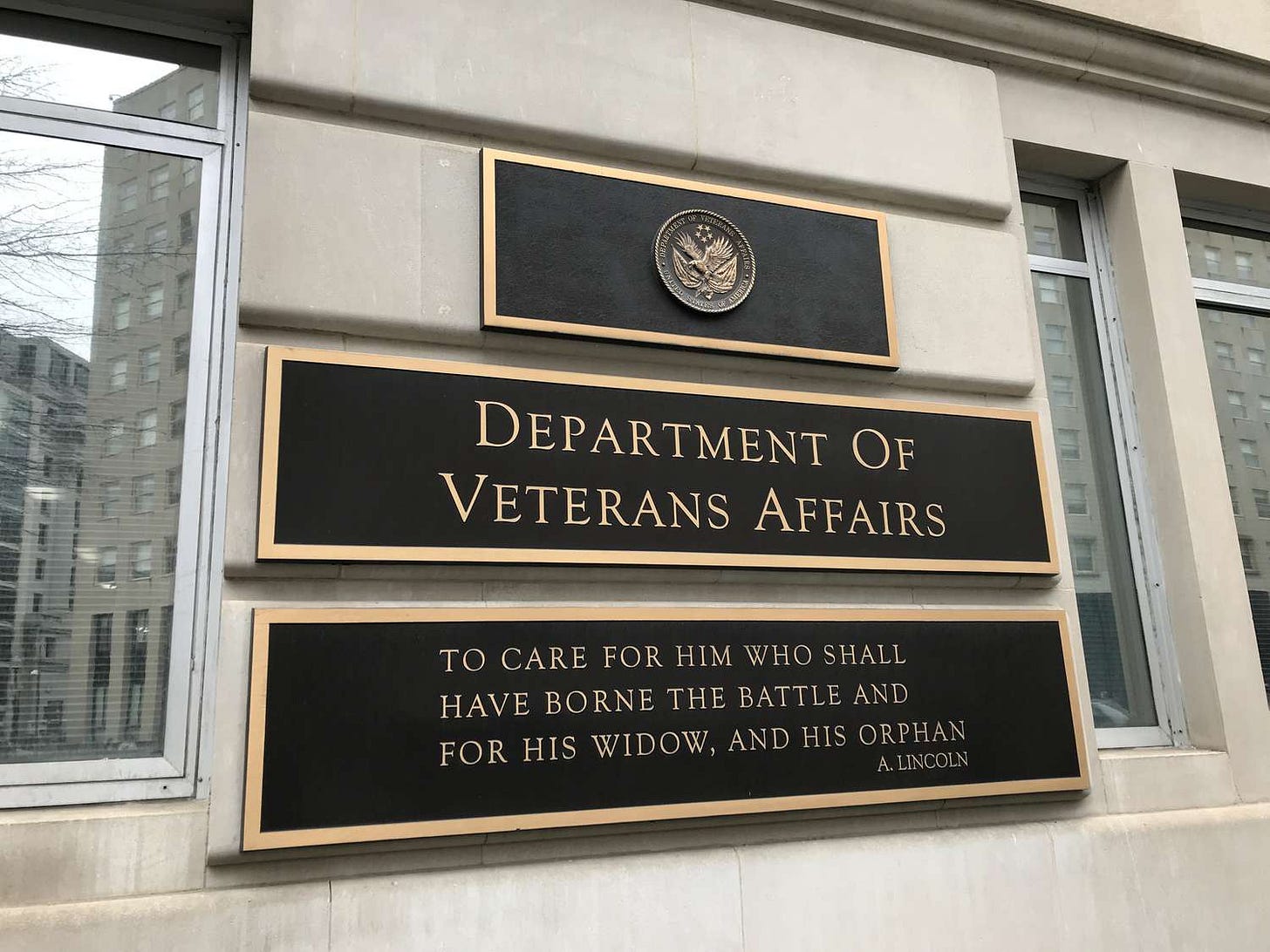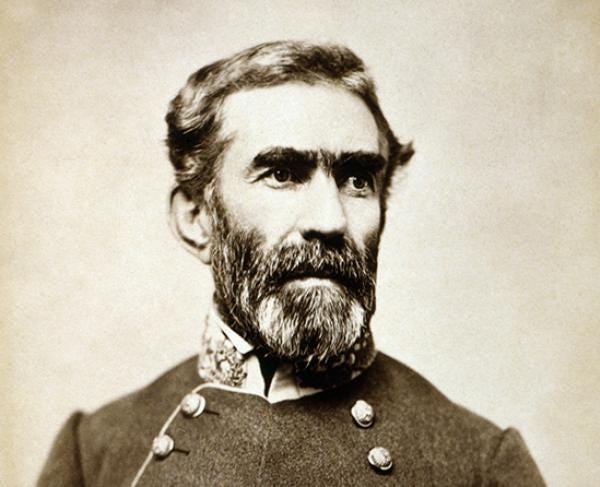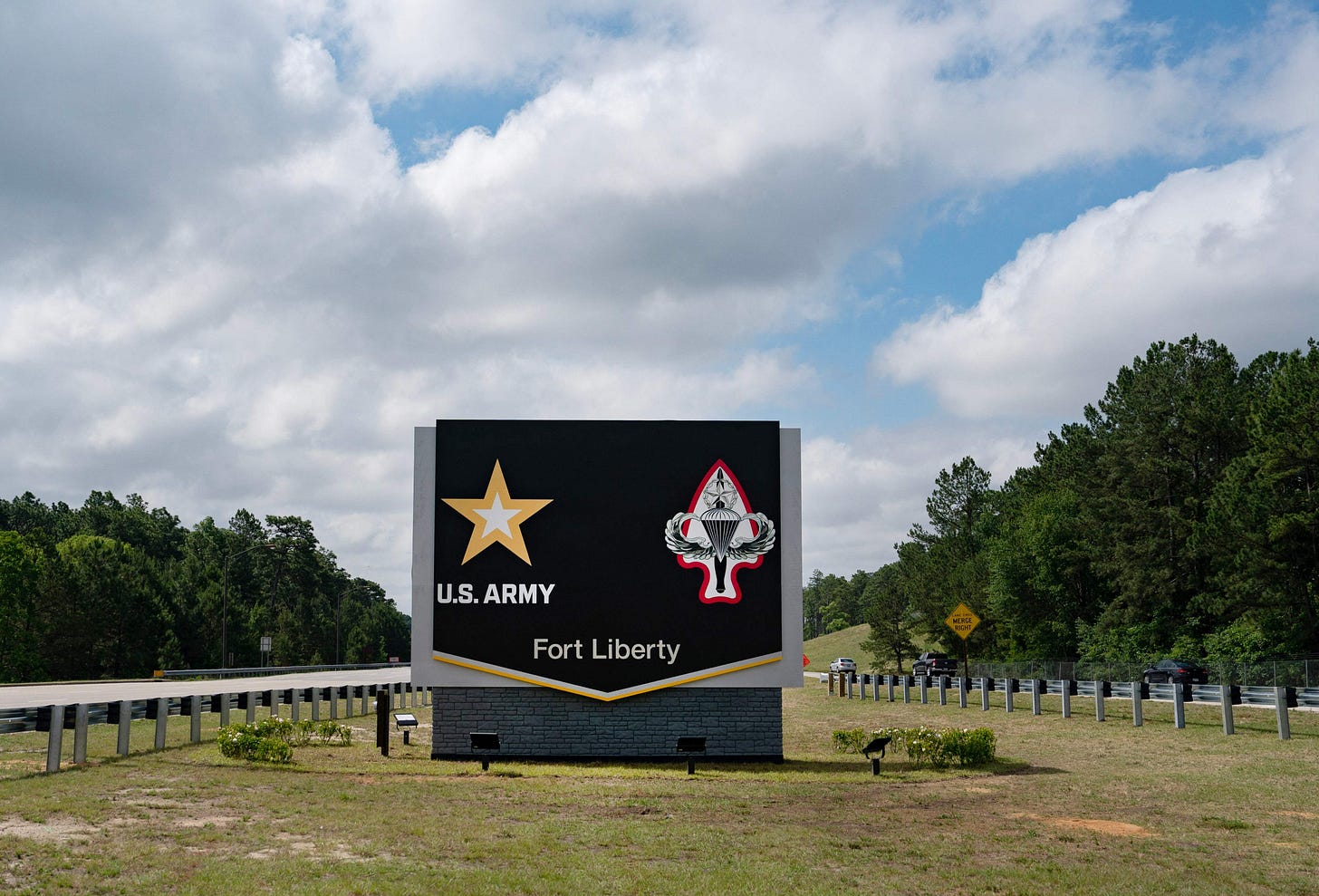Veterans Left Behind, Millions Spent on Confederate Names, and Europe on Edge
From VA layoffs to costly base renaming and Ukraine’s uncertain future—how recent decisions are reshaping America’s priorities.
Last week, the Department of Veterans Affairs, the group responsible for the health and well-being of our nation’s former service members, announced that it was laying off 1,000 workers as part of DOGE’s cost-cutting initiatives. But the VA is currently in the midst of a staffing crisis, and these cuts are likely to impact those the department is supposed to help: our veterans.
It’s just one example of how DOGE’s slashing of the federal government has a risky human and financial cost.
Veterans Affairs
Greg House, a disabled veteran, recently received an email dismissing him from his VA job, for no reason other than his status a probationary employee. It wasn’t his performance, House says, because his work was rated as “outstanding” on his most recent performance review. “Feels like a copy/paste mass firing that takes nothing into account of the people, the human cost,” House said. “The idea that the federal workforce is too bloated feels like a scapegoat more than anything else. Nobody joins the federal government to get rich."
To the people laid off, this is “a Pearl Harbor” event – one in which they feel betrayed and blindsided.
Senator Richard Blumenthal, a member of the Senate Committee on Veterans’ Affairs, said that newly hired doctors, nurses, and medical personnel were among those fired. According to Blumenthal, “It is reprehensible to target recently hired federal employees — particularly those who have chosen to serve veterans — solely because they have less due process rights and employment protections than other employees. It is a massive waste of taxpayer dollars to fire employees the department just invested months into recruiting, vetting, and training.”
The VA said the layoffs will save them more than $98 million a year. But the department has been suffering from major staffing shortages for the past five years, and they are in serious need of physicians, nurses, and psychologists.
The VA serves nine million veterans, and 86% of their facilities reported medical officer shortages last year.
Meanwhile, VA researchers study illnesses that impact veterans — including cancer, PTSD, alcohol and opioid addiction, and prosthetics. Short staffing means that this research is halted or left incomplete, and patients who are in VA trials could be left without lifesaving care. The VA cannot improve care in the future without a robust staff,.
Five unions have sued over DOGE’s firing of probationary workers. The unions say the mass firings are illegal because they violate the formal process used by the government to lay off employees. They claim Trump is not laying off anyone using the “specified, allowable reasons,” but instead for “the purpose of 'eliminating waste, bloat and insularity.”
In a statement, VA Secretary Doug Collins said, "At VA, we are focused on saving money so it can be better spent on veteran care. We thank these employees for their service to VA. This was a tough decision, but ultimately it's the right call to better support the veterans, families, caregivers and survivors the department exists to serve."
How cutting employees based on length of time employed alone will lead to better care for veterans is unclear.
Renaming Military Bases
Meanwhile, another move involving the military will only increase government spending. Last week, Secretary of Defense Pete Hegseth signed a memorandum directing Fort Liberty to change its name back to Fort Bragg.
The base was originally named after Braxton Bragg, a Confederate general and enslaver. Bragg lost nearly every battle that he led his troops into, causing massive casualties for the Confederate Army. One soldier who served under General Bragg called him a “merciless tyrant” who had an “uncanny ability to turn minor wins and losses into strategic defeat.”
That soldier, Sam Watkins, wrote that “not a single soldier in the whole army ever loved or respected him… Bragg often had soldiers flogged, held on display in shackles, and even executed, with only a whisper of a court martial.”
After Bragg’s army was soundly defeated by General Ulysses S. Grant at the Battle of Chattanooga, Bragg resigned. His name and legacy slowly faded away.
During World War I, a US general was looking to name new artillery training camps, including one built in North Carolina, and he decided to use former military officers who had short names. He settled on Bragg, who was a native of North Carolina.
But then in 2020, Congress said that military installations named after Confederates should undergo a name change, and they banned the military from naming any future bases after members of the Confederacy.
At the time, President Donald Trump vetoed the bill, but Congress had enough bipartisan support to override the veto.
Fort Bragg became one of nine Army bases that were renamed. The Army’s naming commission, made up of retired Army, Navy, Marine Corps officers, as well as Republican Rep. Austin Scott from Georgia, wrote that they were purposefully not picking any "substitute" names, like finding another soldier with the same name. The commission settled on Fort Liberty as the new name of the former Fort Bragg.
Renaming these bases was not inexpensive. The cost of changing Bragg to Liberty was more than $6 million, and renaming all nine bases was estimated to cost about $62.5 million. Tens of thousands of signs and all forms of communication, like websites, needed to be changed to reflect the new, non-Confederate names.
Pete Hegseth said, "Fort Bragg has a long and proud history of equipping, training, and preparing our soldiers to fight and prevail in any operational environment,” indicating that the reason for the name change was about the base’s legacy. Now, the millions that were spent to change the name to Fort Liberty will have to be spent again to change the name back to Bragg.
In order to get around the law banning the use of Confederate names, Hegseth ordered that the base be named after Amy Private Roland Bragg, who served for two years in WWII and later went on to own an auto body shop.
Roland Bragg’s 1999 obituary says he was briefly caught by German troops but escaped. He then commandeered an ambulance and drove it, with other Americans inside, through enemy fire to safety. Hegseth’s memo said Roland Bragg “received the Silver Star for conspicuous gallantry and intrepidity, and the Purple Heart for wounds sustained during the Battle of the Bulge.”
More name changes are likely to come. During his first term when he vetoed the bill changing the name, the White House issued a press release saying, “President Trump has been clear in his opposition to politically motivated attempts like this to rewrite history and to displace the enduring legacy of the American Revolution with a new left-wing cultural revolution.”
Europe is Panicking
The US has given billions of dollars in arms and other support to Ukraine since Russia invaded in 2022. But President Trump has signaled that changes are coming, and those changes have sent some European leaders into panic mode.
Last Wednesday, Secretary of Defense Pete Hegseth met with NATO members in Brussels to talk about Ukraine. It was a meeting of the Ukraine Defense Contact Group, an alliance of about 50 countries who support Ukraine in its fight against Russia.
Hegseth said that it was unrealistic to think Ukraine would become a member of NATO and that it was unlikely Ukraine would get its territory back from Russia. Europe should take on most of the financial and military responsibilities, Hegseth said, instead of the US.
(NOTE: I attended the NATO conference this summer, at which all members of NATO committed to making Ukraine a member in the future. They specifically said that it’s not “if” Ukraine will become a member, but “when.”)
Hours after Hegseth’s speech, President Trump spoke with Russian President Vladimir Putin by telephone. He announced to reporters afterward that US officials would meet with Russia in Saudi Arabia. Ukrainian President Volodymyr Zelensky said that he, “Did not know anything about it [the meeting],” and that, “Ukraine regards any negotiations on Ukraine without Ukraine as ones that have no result.”
On Saturday, Zelensky said that it’s time for an “army of Europe.” Speaking at the Munich Security Conference, a group whose main objective is “to build trust and to contribute to the peaceful resolution of conflicts by…the international security community,” Zelensky remarked,“Let's be honest. Now we can't rule out the possibility that America might say no to Europe on an issue that threatens it. Many, many leaders have talked about Europe that needs its own military - an army of Europe."
Also on Saturday, US Special Presidential Envoy for Ukraine and Russia Keith Kellogg said the European Union and the United Kingdom will not have a seat at the negotiating table for peace in Ukraine, but that allied interests would “be taken into account.”
Not being part of the negotiations set off alarm bells throughout Europe. German Chancellor Olaf Scholz urged his parliament to pass a resolution that would declare “a state of emergency” because of the impact the war in Ukraine has on the security of Germany and Europe. Here is a translated version of his comments.
Scholz said, “Today we must face the reality of what the US government’s actions and announcements mean for Ukraine, for Europe, and for the world. Not acting would mean putting the security of our country and our continent at risk. I won’t allow that.”
It is the consensus view of European leaders that the conflict between Russia and Ukraine is an existential one for them. A situation in which Russia is emboldened to seize territory by force means that the same could happen elsewhere. UK Foreign Minister David Lammy said that the war in Ukraine is the frontlines of a war on Europe.
Yesterday, France held an emergency meeting with leaders from Germany, Poland, Italy, Spain, the UK, the Secretary General of NATO, and more, to discuss the issue.
Ursula von der Leyen, the president of the European Commission, had this to say on X:
What an urgency mindset will yield has yet to be seen, but it’s clear that the leaders of Europe are beginning to panic about what Russia will do to Ukraine, and what it mean for them.











We included three shorter stories today instead of one medium length one. Would love your thoughts: do you like more, shorter pieces? Prefer one longer story per day? We are building The Preamble to serve you, so let us know your thoughts. ❤️
What I would love from DOGE is an analysis comparing the projected savings against the new costs this decision will create. My husband is a disabled veteran who receives his healthcare at our VA hospital. The line is “30 days or 30 miles”… if he can’t be seen in 30 days or within 30 miles of his home at another VA facility, he can go outside of VA’s network to get care and VA pays. We are lucky to be surrounded by multiple large prestigious healthcare facilities… how much will these layoffs delay care and increase the need for VA to pay for costly services to third parties?
Additionally, my husband is now going to medical school under a program called HPSP. This was extended to VA by President Trump in his first term to address provider shortages at VA. School is paid for and then he will owe 6 years to VA when he is a doctor. This was a win win for us because he wants to work at VA as a physician anyways- it is his calling. We realized he would have likely been laid off had he been a newly minted doctor when this happened. Think about the hundreds of thousands of dollars spent just for my husband alone that they would flush down the drain…
The VA health system has made great strides in the last few decades to break free of the stereotype of poor care. I’m so nervous we will see a swift backslide all for the purpose of “gross savings” on paper reported by DOGE that are likely either incorrect or more likely not properly netted against all of the new costs they create. It’s not a representative picture of the bottom line impact.